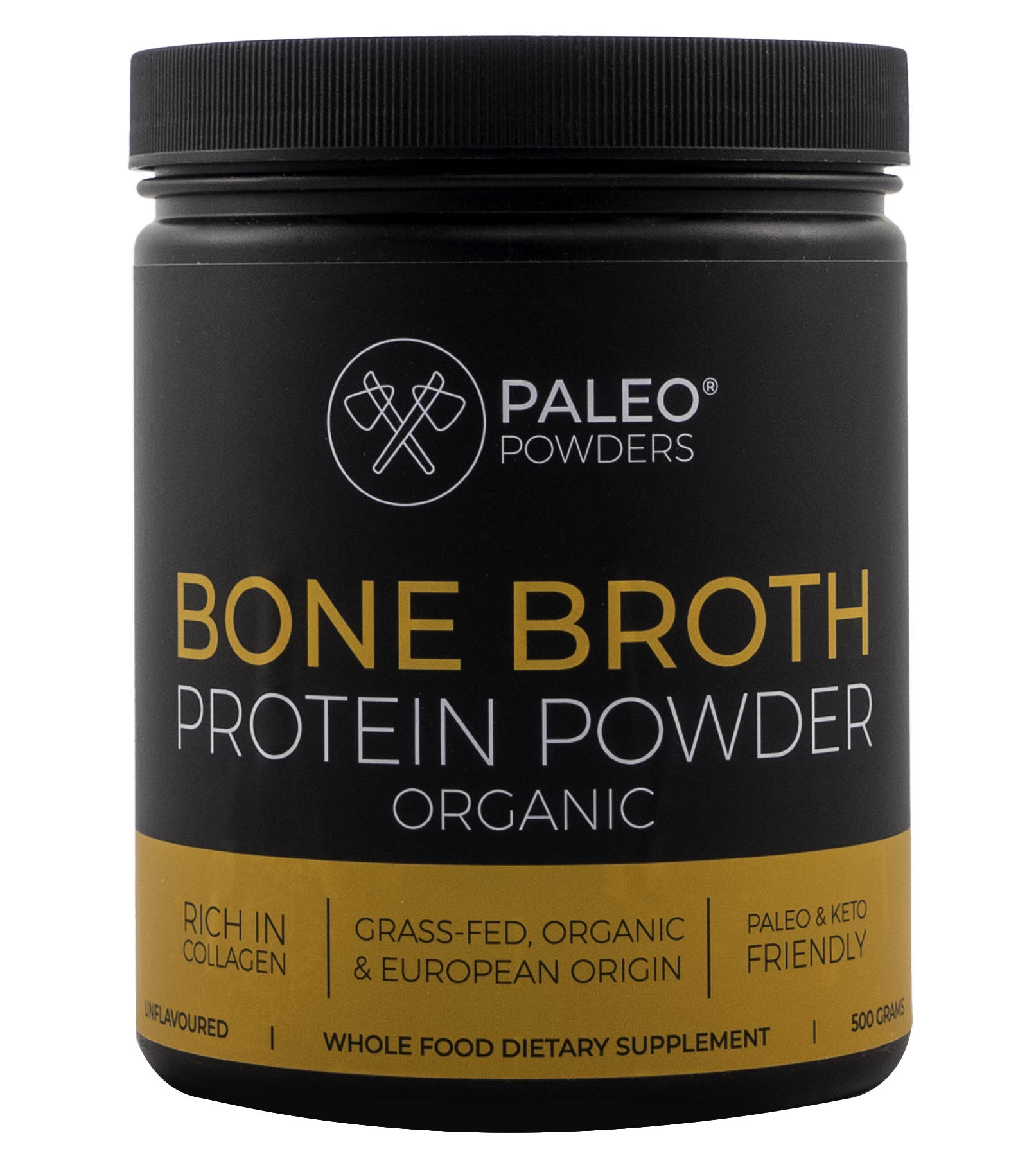



Bone Broth - Bone Broth - Grass Fed - 500 grams
Bone broth, also known as bone broth, is a traditional and age-old soup made by boiling animal bones in water. Our bone broth powder is made exclusively from certified organic beef bones, sourced from European grass-fed cows that are rich in meat and bone marrow. Dehydrating and powdering the bone broth results in a concentrated, extremely nutritious powder with a fine structure, rich in collagen.
The Power of Bone Broth: Nutritional Value and Versatility
Bone broth is very versatile, easy to use and suitable for modern times. Of course with the authentic nutritional value of homemade bone broth. What used to be standard and normal food is now trending and popular. This after being forgotten for years. Find out why we think taking collagen-rich bone broth daily is essential and why quality matters.
The benefits of bone broth - Bone broth
- Neutral taste
- Contains glycine, proline and hydroxyproline
- Keto-friendly: 0 grams of sugar
- Free from dairy and vegetable proteins
- Contains collagen types I, II, III, IV and V
- Contains glucosamine, chondroitin and hyaluronic acid
- >95% protein per dose
- 100% European origin
- From grass-fed, pasture-raised cattle
- 500 grams per pot
Why is collagen-rich bone broth powder worth a try?
- Like all your other living and dynamic tissues, your body's own collagen requires input from the environment and nutrition to function and maintain optimal quality.
- From around the age of 40, your body's ability to produce collagen begins to decline. It is then about 25% less than when you were younger. When you are 60 years old, it is about 50% less.
- Collagen is rich in the amino acid glycine. It therefore balances the intake of muscle meat from an amino acid perspective. Muscle meat is rich in the amino acid L-methionine. The balance between these two amino acids is an important health factor.
Difference with collagen
Compared to collagen hydrolysate supplements, a high-quality bone broth powder provides a broader spectrum of nutrients. Collagen is broken down (denatured) into gelatin in bone broth, making it easily absorbed by the body.
It contains, among other things, more different types of collagen. Collagen type I is the main form in our bone broth, but collagen types II, III, IV and V are also present. In addition to collagen, hyaluronic acid and other natural glycosaminoglycans (GAGs) such as glucosamine and chondroitin are also typically present in bone broth. This makes bone broth a more complex and richer product than collagen hydrolysate. Our bone broth mixes easily with liquids and has a mild, savory flavor.
- However, while collagen hydrolysate only contains collagen type I, gelatin in bone broth consists of several types of collagen (collagen types II, III, IV and V).
- Bone broth contains more nutrients, such as essential minerals, fats and special carbohydrates (glycosaminoglycans, also called GAGs).
- Although gelatin in bone broth is richer, both forms contain essential amino acids that are easily absorbed and have the same properties.
Paleo and keto approved
Bone broth protein powder is made with paleo-approved ingredients and paleo-responsibly sourced. This product delivers the exceptional nutritional value of a European, organic and grass-fed beef bone broth. It provides your body with valuable and nutritious collagen proteins that are rarely found in our diet today. Collagen is the most abundant protein in the human body and is found in many tissues, from muscles and joints to the skin. Maintaining and replenishing your body's own collagen has never been easier. Bone broth protein powder gives you all the benefits of homemade bone broth, but without the hassle.
Most collagen proteins in bone broth powder are not hydrolyzed, or broken down, into small peptides. This is in contrast to the collagen proteins that you find in collagen hydrolysate powder. Thus, most of the protein remains intact with a molecular weight of 8-20 kDa. If you prefer a less refined, less denatured or less hydrolyzed collagen supplement, bone broth powder is the right choice.
A well-made bone broth depends not only on the cooking process alone, but also on the quality of the ingredients used. High-quality, organic, European grass-fed beef bones and clean Northern European groundwater are two simple, yet crucial ingredients that make our bone broth so effective. The fleshy marrow-containing bones release their nutrients into the clean groundwater in which they are cooked. This makes the nutrients easy and immediately absorbable by your body.
- Did you know that your body cannot make the essential amino acids needed to make collagen? It is therefore important to get enough every day through your diet.
- Did you know that bone broth, due to its gelatin/collagen content, has a very fundamental relationship with water? It attracts and retains water. This is one of the reasons why your gut loves it!
- Did you know that your bones are made of living tissue? The collagen in bone tissue is continuously replenished and remodeled as long as you live. About 10% of the bone is replaced every year. So you get a completely new skeleton approximately every 10 years.
Gelatin and collagen are similar but not identical. Gelatin is what you get when you cook collagen. Hydrolyzed collagen is what you get when you cut collagen into smaller fragments. They both contain the same amino acids, but with different chemical and organoleptic properties. Choose one variation or combine both: you can use them based on personal preference, needs or specific indication(s).
Difference Collagen, Bone Broth & Kefir
|
Collagen Hydrolysate |
Bone Broth |
Kefir Whey |
|
Neutral taste |
Mildly savory |
Creamy |
|
Fast absorption |
Normal absorption |
Fast absorption |
|
Hydrolyzed |
Not hydrolysed |
Semi hydrolyzed |
|
Collagen types I & III |
Collagen types I to 5 |
No collagen |
|
Enzymatic |
Pulled slowly |
Kefir fermented |
|
95% proteins |
98% proteins |
90% proteins |
|
95% collagen |
78-84% collagen |
0% collagen |
|
No dairy |
No dairy |
Dairy whey |
|
0% fat |
2-5% fat |
0% fat |
|
0% sugars |
0% sugars |
0% sugars |
|
Glycine 21.6% |
Glycine 20% |
Glycine 1.5% |
|
BCAAs 7.42% |
BCAAs 8.4% |
BCAAs 23.75% |
|
Hydroxyproline 10.6% |
Hydroxyproline 10.2% |
Hydroxyproline 0% |
|
From bones |
Fleshy bones |
Meadow milk |
|
No glucosamine |
Contains glucosamine |
No glucosamine |
| No chondroitin | Contains chondroitin | No chondroitin |
| No hyaluronic acid | Contains hyaluronic acid | No hyaluronic acid |
Bone biology
Bone is mineralized connective tissue consisting of several types of cells: osteoblasts, osteocytes and osteoclasts. Despite its inert appearance, bone is a very dynamic organ. Bone remodeling is a very complex process in which old bone is replaced by new bone. One way bones adapt is through the forces and mechanical loads they are exposed to. Due to highly physically active daily lives and often harsh natural environments, the skeletons of our primeval ancestors contained robust bones. Muscle attachments even resemble those of today's professional athletes. This would allow them to compete with the modern athletic top. Just as bone quality can improve with the right stimuli and good nutrition, it can also degrade with a lack of stimuli and poor nutrition.
European organic grass-fed beef bone broth
Our bone broth is made from certified-organic grass-fed cattle. During the winter months the cattle are housed in stables, but are still fed natural and nutritious grass in the form of silage (fermented grass) or hay. Supplementary concentrates are used as little as possible and only when really necessary for optimal health of the animals. Because our product is made responsibly and organically from start to finish in Europe, it is very sustainable. Our bone broth protein powder is the best option in terms of quality, sustainability, animal welfare and environmental ethics.
Quality is important
It is known that protein products made from bones and other collagen-rich tissues can contain traces of unwanted chemicals and heavy metals. So not all bone broth protein powders are the same. The quality and origin of the ingredients are very important. Animal-friendly, organic and sustainable purchasing solves most of these problems. This is because contaminants are not only a consequence of process flows, but mainly of the way the livestock are kept, where the livestock are kept and under what conditions.
Testing for heavy metals
Quality control, product safety and transparency are very important to us. That is why we thoroughly screen each analysis certificate and, to be on the safe side, double analyze each new batch for heavy metals in an external laboratory. Below you can find typical values.
- Arsenic (As) less than 0.10 mg/kg = less than 0.1 PPM
- Cadmium (Cd) less than 0.01 mg/kg = less than 0.01 PPM
- Lead (Pb) less than 0.05 mg/kg = less than 0.05 PPM
- Mercury (Hg) less than 0.005 mg/kg less than 0.005 PPM
Homo-soup-ians
It was long thought that steeping soup and broth became common between 5,000 and 9,000 years ago. This is because cooking was an infrequently used cooking technique before the invention of waterproof and heat-resistant cooking pots about five thousand years ago. However, it turns out that these initial estimates are off by at least 15,000 years. Waterproof and heat-resistant pots were invented much earlier than previously thought, around 20,000 years ago. But even 20,000 years may not be far enough back for stock and soup making.
Man-made pots were not necessary to make broth or soup in prehistoric times. There is much evidence that our ancestors could have simply dug a hole, lined it with animal skin or entrails, filled this "pot" with water and dropped hot rocks into it. The force of the steam cracks the rocks and this is a characteristic feature that first appeared in archaeological finds about 25,000 years ago. Other soup and stock cooking techniques may be even older. For example, it is also possible to use waterproof containers such as a hung animal skin over a fire. The water inside ensures that the material does not burn, but does cause the contents to boil.
So from at least 25,000 years ago, soups and broths have been a healthy, nutritious and important food source. Only very recently in the Anthropocene (the most recent time period) has broth become less prominent in our diets. This created a lack of daily collagen, and specifically associated amino acids.
Power of bone broth
Today, we know from research that bone broth is one of the most nutrient-dense and powerful foods. When cooking a stock, all the collagen from the bones is broken down and dissolved in the water. After the bones have been cooked, the broth contains an abundance of amino acids and other nutrients. Making your own bone broth is time-consuming and not a fun activity for everyone. Cooking is a slow process and finding good quality bones is often not easy. Although humans have relied on collagen-rich bone broths to nourish their bodies for thousands of years, modern life is often not designed to make them.
Organic bone broth powder is on par with foods you would consume every day and are appropriate with even the strictest paleo lifestyle. It's made from wholesome ingredients that meet important paleo quality standards: organic grass-fed pastured beef, lactose-free, dairy-free, and double tested for heavy metals.
Our (r)evolutionary products are not only based on ancient nutritional wisdom but also on modern knowledge and innovation. Health and performance can no longer be seen separately. Bone broth powder supports both, and you reap the benefits. Keep your body in shape, your brain sharp and your soul connected!
Our European organic bone broth broth offers the benefits of bone broth without the hassle of home preparation, in a practical powder form. You can easily take it with you on the road. Our collagen is made from fleshy marrow bones. It is a healthy nutritional supplement suitable for many types of shakes and smoothies, and countless recipes.
Inhoud
Instructions
INGREDIENTS
Choose options





